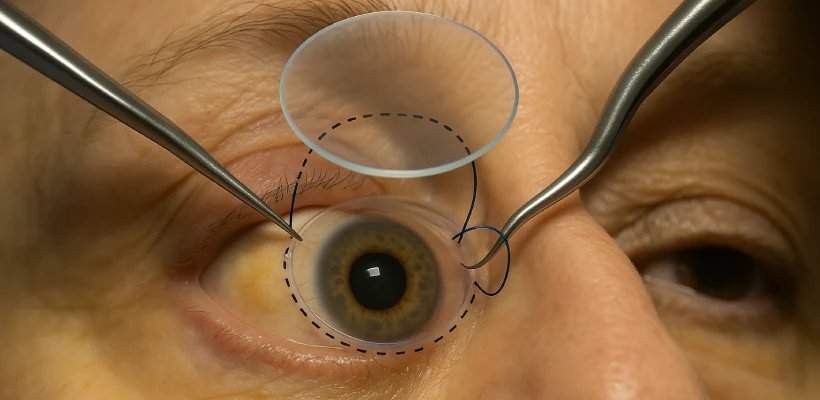What is Corneal Transplantation?
Have you ever wondered how a damaged cornea can be restored to save your vision? Corneal transplantation, also known as corneal grafting, is a life-changing surgical procedure that restores vision by replacing a damaged or diseased cornea with a healthy donor cornea. The cornea, the clear, dome-shaped surface at the front of the eye, plays a crucial role in focusing light and enabling clear vision. When the cornea becomes cloudy or scarred due to conditions such as keratoconus, Fuchs’ dystrophy, or severe infections, corneal transplantation becomes a viable solution to regain sight. At Smart Vision Eye Centre in Andheri East, Mumbai, Dr. Seema Behl, a distinguished ophthalmologist, specializes in performing successful corneal transplants, offering patients renewed hope for clear vision.
Why is Corneal Transplantation Necessary?
Corneal transplantation becomes necessary when the cornea is damaged or diseased to the extent that it impairs vision and cannot be corrected with glasses or contact lenses. Conditions such as keratoconus, where the cornea thins and bulges outward; Fuchs’ dystrophy, which affects the corneal endothelium; and corneal scarring from infections or injuries can significantly reduce vision clarity. Additionally, genetic disorders and degenerative diseases can lead to corneal opacity, making transplantation essential for restoring sight.
What are the Different Types of Corneal Transplants?
Corneal transplantation encompasses several types, each tailored to address specific layers of corneal damage:
- Penetrating Keratoplasty (PK): A full-thickness corneal transplant where the entire cornea is replaced.
- Lamellar Keratoplasty: Only specific layers of the cornea are replaced, preserving healthy parts.
- Deep Anterior Lamellar Keratoplasty (DALK): Replaces the front layers of the cornea.
- Descemet’s Stripping Endothelial Keratoplasty (DSEK) and Descemet Membrane Endothelial Keratoplasty (DMEK): Replace the innermost layers.
- Boston Keratoprosthesis: An artificial cornea used when traditional transplants are not viable.
Dr. Seema Behl expertly determines the most suitable type of transplant based on the extent and location of corneal damage, ensuring personalized treatment for each patient.
How is a Corneal Transplant Performed?
A corneal transplant is typically performed under local or general anesthesia, depending on the patient’s condition and the complexity of the surgery. The procedure involves several key steps:
- Preparation: The patient’s eye is numbed, and the area is sterilized.
- Removal: The damaged cornea is carefully removed using precise surgical instruments.
- Donor Cornea Placement: A healthy donor cornea is sutured into place, aligning it with the patient’s eye structures.
- Post-Operative Care: Protective contact lenses may be applied, and a regimen of medications is prescribed to prevent rejection and infection.
At Smart Vision Eye Centre, Dr. Seema Behl employs advanced surgical techniques and state-of-the-art equipment to ensure the highest success rates and minimal recovery time for her patients.
What is the Recovery Process Like After a Corneal Transplant?
Recovery from a corneal transplant involves several stages to ensure proper healing and graft acceptance:
- Immediate Post-Surgery: Patients may experience blurred vision, redness, and mild discomfort. Protective eye shields are often worn to safeguard the eye.
- Short-Term Recovery: Sutures are typically removed within a few weeks, and vision gradually improves. Regular follow-up appointments are essential to monitor healing.
- Long-Term Care: Patients must adhere to a strict regimen of eye drops to prevent rejection and infection. It may take several months for vision to stabilize fully.
Dr. Seema Behl provides comprehensive post-operative care and guidance, helping patients navigate the recovery process smoothly and effectively.
What are the Risks and Success Rates of Corneal Transplantation?
Like any surgical procedure, corneal transplantation carries some risks, including:
- Rejection of the Donor Cornea: The body may recognize the new cornea as foreign and attempt to reject it.
- Infection: Post-surgical infections can occur if not properly managed.
- Astigmatism: Irregular healing may cause astigmatism, affecting vision clarity.
- Glaucoma: Increased eye pressure can develop after the transplant.
Despite these risks, corneal transplantation boasts high success rates, particularly when performed by experienced surgeons like Dr. Seema Behl. With proper patient selection, meticulous surgical technique, and diligent post-operative care, the majority of patients achieve significant vision improvement and enhanced quality of life.
Corneal transplantation is a remarkable procedure that can transform the lives of those suffering from severe corneal damage. With the expertise of Dr. Seema Behl at Smart Vision Eye Centre in Andheri East, Mumbai, patients receive top-tier care tailored to their unique needs. From diagnosing the necessity of a transplant to performing the surgery and managing post-operative recovery, Dr. Behl ensures a comprehensive and compassionate approach to restoring your vision. If you are experiencing corneal issues or considering a corneal transplant, book an appointment with Dr. Seema Behl today. Take the first step towards clearer vision and a brighter future with the best ophthalmologist in Mumbai by your side.

